The history of Mississauga - Part 2
/Modern Mississauga and Heritage Mississauga have come together to present an ongoing series called “Way Back Wednesday.” We’ll share information about the history of Mississauga here and answer your questions.
Today’s topic is the history of Mississauga, Part 2.
If you missed Part 1, click here.
War of 1812 - Daniel Merigold - Springcreek Cemetery
The first connects to the oldest component of the Museums of Mississauga, the Bradley Museum. Lewis Bradley (1771-1843), the museum’s namesake and the builder of the Bradley House (c1830), served as the Adjutant of the 2nd Regiment of York Militia in the early months of the war. His wife, Elizabeth, was the daughter of Captain Thomas Merigold, and several other Merigold children also served with the militia. Lewis Bradley was served as the Adjutant with the 2nd York from June to December of 1812, and was later engaged with the embodied militia with road maintenance along Dundas Street and in transport of supplies in 1813. The Bradley House museum, although relocated in 1965, remains on a portion of the original Bradley family farm. It was opened as a museum in 1967.
Thompson Street in Erindale is named for Captain (later Colonel) William Thompson (1784-1860). His notable life and career were covered in an earlier article in this series. However an interesting tidbit to share from the War of 1812 revolves around his mother, Rebecca. Rebecca Thompson (nee Emmons, 1759-1828), was the mother of Captain William Thompson. All four of her sons (William, Augustus, Frederick and Cornelius Oliver served in the war (Cornelius Oliver died in the war). One article, referencing the family’s involvement, states of Rebecca’s sons: “… being actuated by their spirit of loyalty to their country, and inheriting the true principles of their father and mother, they were actively employed throughout the several campaigns …”
Another point of interest connect to Rebecca herself, which is notable as we have very few direct references to women’s involvement in the war. Recorded through family correspondence in 1930s. it refers to an incident in which Rebecca may have shown her own mettle during the war: “In 1813 American ships on Lake Ontario strayed close to shore in pursuit of British ships from York. Rebecca Thompson, witnessing the passing of several ships in close proximity to the shore, and with her sons away with the militia, took aim with a musket and fired at a passing ship. She let it be known that the enemy would find no friendly shelter on the shore.” While the precise date of this incident is unknown, one wonders if it may have been connected to the Fall of York in April 1813, or to the “Burlington Races” of September 1813.
Another well-known name on our landscape relates to the Merigold family. Our oldest settled area in Mississauga is in the Clarkson area, which was informally referred to as “Merigold’s Point” (there is a book with that title on the early families who settled here). As previously mentioned, the Merigold family was heavily involved in the War of 1812. This account is referenced to Daniel Merigold (1795-1863), who served in the 2nd York alongside his father, Thomas Sr., and brothers Thomas Jr. and Amos:
War of 1812 - Lewis Bradley - Springcreek Cemetery
“Enemy craft were often to be seen sailing by, and on an April day they saw the topsails of an enemy flotilla bearing down on York. The wind brought to the anxious listeners on Merigold’s Point the sullen booming of heavy guns and the faint mutter of rifle fire. In the far distance there shot up a column of black smoke that mushroomed slowly out, and then a deep muffled explosion. The magazine of the fort had been heroically blown up and with it a mass of American invaders.
That night the sky over York was lurid with the flames of burning buildings, and the watchers lay down with sad hearts, fearful that their country had suffered an irreparable disaster. The boys were frantic to take the boat and see what had happened, and it was all Elizabeth Merigold could do to restrain them. Two days later Tom and Amos slipped away at dawn. They crossed the bay and hid the boat in one of the marshy inlets just west of the fort. Scouting through the forest, they came upon the blackened ruins.
Their distracted mother pacing the beach that evening and wringing her hands, saw the sail of the boat glide up through the dusk, and her two missing sons spring ashore.
“Mother, the Yankees burnt York – they burnt all the big buildings and stole everything they could lay hands on. But a lot of them were killed at the fort.”
“I don’t care as long as you’re safe.”
“And, mother, we met Captain Thompson. He was all through the fighting. He says we aren’t beaten yet.”
In bringing the spirit of the War of 1812 to life, please join us this weekend for the exciting event “The Engagement at Bradley 1812” weekend, which takes place on October 19-20 at the Bradley Museum (1620 Orr Road): https://www.2ndyork.com/events













